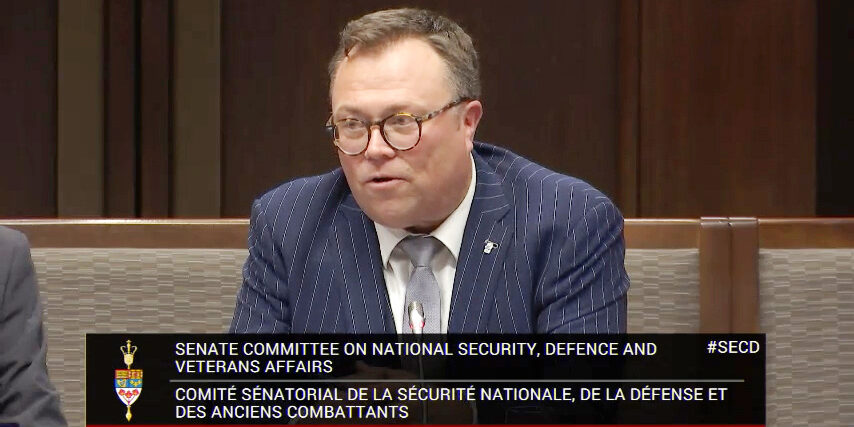The broad primary objective of Russian information and influence operations is to distort our understanding of the world around us and ultimately, to manipulate and affect our democratic processes and policy decisions.
This isn’t new. In 1945 a Soviet intelligence clerk serving in the Soviet embassy in Ottawa defected and outlined the scale of this work when he identified dozens of Canadians who were working with the Soviets to influence our democratic process.
For the Kremlin, those operations are more important today, than ever before. And that threat, in terms of information warfare, and the assault on our cognitive sovereignty is persistent and growing.
Putin is constructing a virtual iron curtain around Russia’s information environment in which the state controls all media.
Disinformation campaigns that once took years to execute now take minutes, with the help of social media, artificial intelligence and an army of pro-Kremlin influencers that amplify Russian narratives in Canada.
Inside of Russia, the Kremlin uses information operations against its own people in order to consolidate power and silence critics.
Putin is constructing a virtual iron curtain around Russia’s information environment in which the state controls all media. The Kremlin has criminalized most independent media outlets and civil society organizations as either undesirable or as terrorists – this list includes the entire LGBTQ community in Russia and even Canada’s Macdonald Laurier Institute.
Abroad, the Kremlin seeks to divide, confuse and sow chaos wherever possible.
The breakdown of cohesion within our international alliances -like NATO- has been a Kremlin objective for 75 years.
Inside western nations, Russia aims to divide us by exploiting both sides of sensitive political issues with the goal of eroding trust in our democratic institutions, our leaders, our media, civil society and ultimately, each other.
Canadian far-left anti-Ukrainian influencers continue to write for and appear on sanctioned Russian state media and Kremlin controlled think tanks.
In Canada, we’ve observed Russian information operations amplifying vaccine hesitancy even before COVID – targeting MMR and other children’s vaccinations. Extremist far-right anti-government voices within the Freedom Convoy movement were platformed by Russian state media in 2022. Russian anti-LGBTQ narratives are amplified by far-right extremists and platforms in Canada.
Canadian far-left anti-Ukrainian influencers continue to write for and appear on sanctioned Russian state media and Kremlin controlled think tanks.
Ukraine has been the primary target of Russia’s information and influence operations for the past two years, with the objective of eroding public and government support for Ukraine.
This includes false claims about corruption and the resale of the weapons that the west has donated to Ukraine, and wild conspiracies about non-existent Ukrainian bioweapons.
They also include narratives intended to incite hate towards Ukrainians – this includes, baseless accusations about Ukraine’s president Zelenskyy, his government and Ukrainians of being neo-Nazis.
Canadian Human rights legal expert, Yonah Diamond at the Raoul Wallenberg Centre, says that this narrative is part of the Kremlin’s “accusations in a mirror” tactic by which Russia frames and presents Ukrainian and Ukrainians as an existential threat, which makes hate and violence against Ukrainians appear to be defensive and justifiable.
According to the Ukrainian Congress, incidents of hate and violence towards Canadians of Ukrainian heritage have been rising over the past two years.
These narratives are repeated by far-left and far-right platforms in Canada. And they continue to be spread in parts of the Russian diaspora community in Canada, threatening radicalization, through Canadian online streaming services that evade Canadian restrictions on Russian state media and even our sanctions.
These narratives are also impacting Canadians. According to the Ukrainian Congress, incidents of hate and violence towards Canadians of Ukrainian heritage have been rising over the past two years. Last year, a letter was sent to the Estonian Honorary consul in Toronto threatening to spread anthrax in the community if Estonia continued to support Ukraine.
The impact of these narratives is intensified when Kremlin narratives ricochet between far-left and far-right platforms and influencers. At the bottom of the political horseshoe are US far-right politicians like Marjorie Taylor-Greene who regularly amplifies false claims about Ukraine – and on the far-left platforms, like Montreal’s Global Research.
This is seemingly impacting Western opinions and policy towards Ukraine. Polling among conservative voters, indicates that support for Ukraine has significantly dropped over the past two years. In 2022, just 20% of Conservative voters believed Canada was giving too much to Ukraine versus 43% in February 2024.
In the US, 48% of Republican voters believe the US is giving too much to Ukraine today versus just 9% in March of 2022.
While Canada has taken major steps to defend our cognitive sovereignty – there is still much to learn from our allies, in Ukraine and the Baltic Sea region to challenge expose these narratives and the influencers who amplify them in Canada and the western world.




